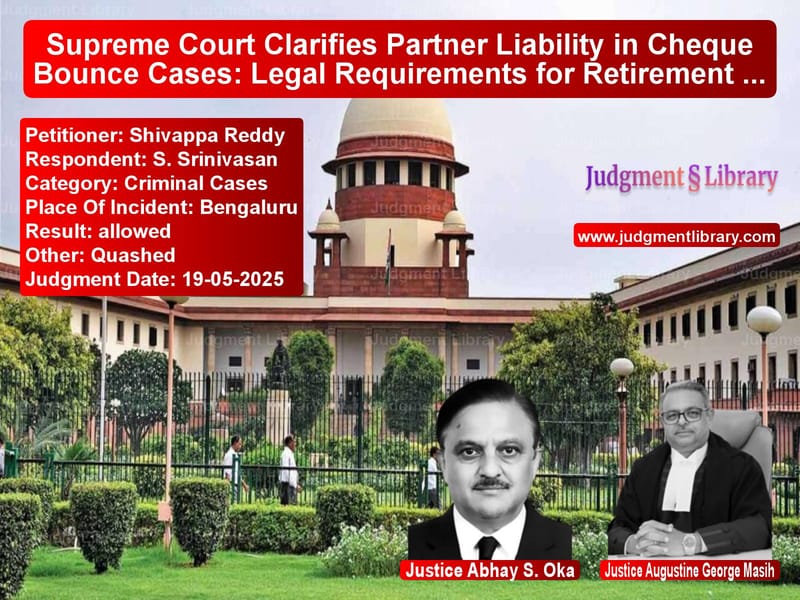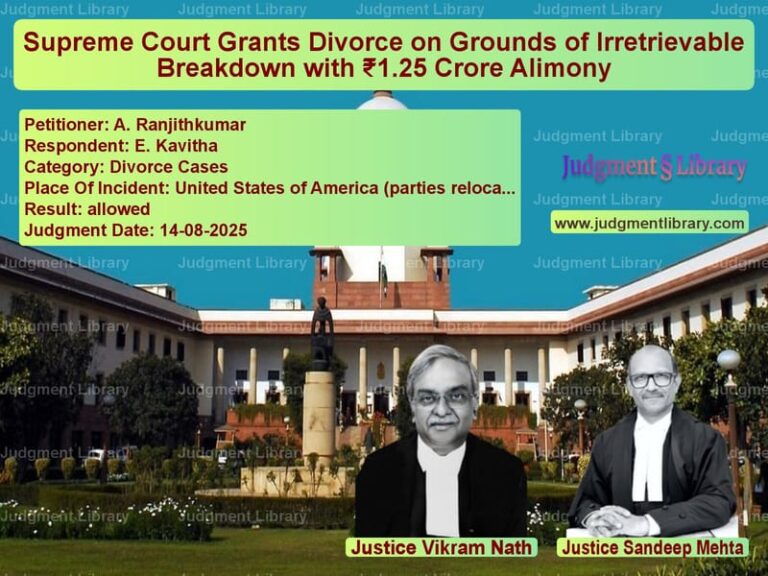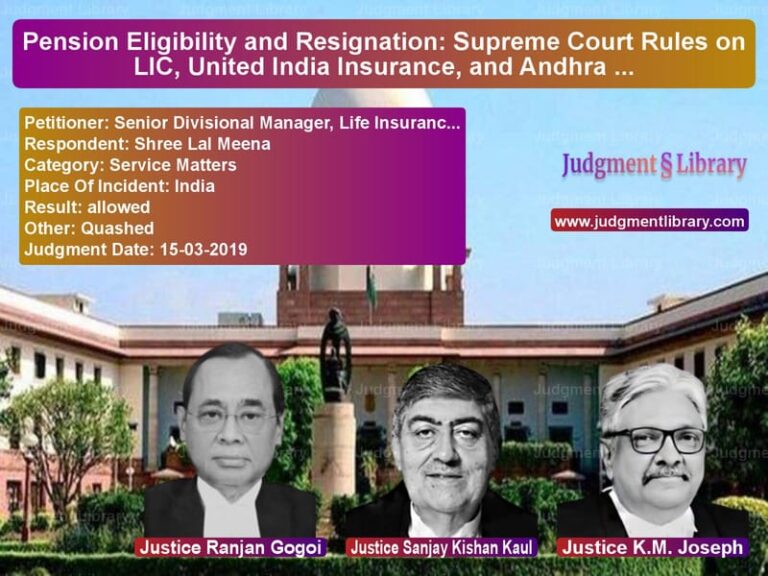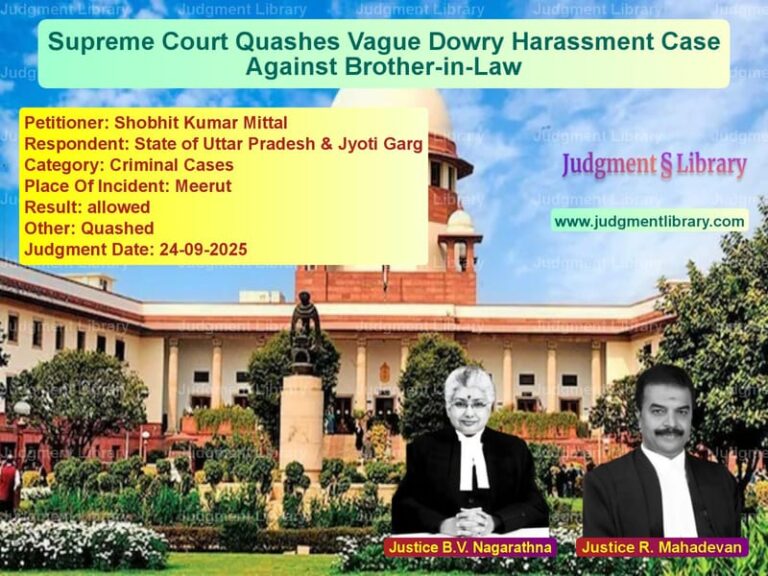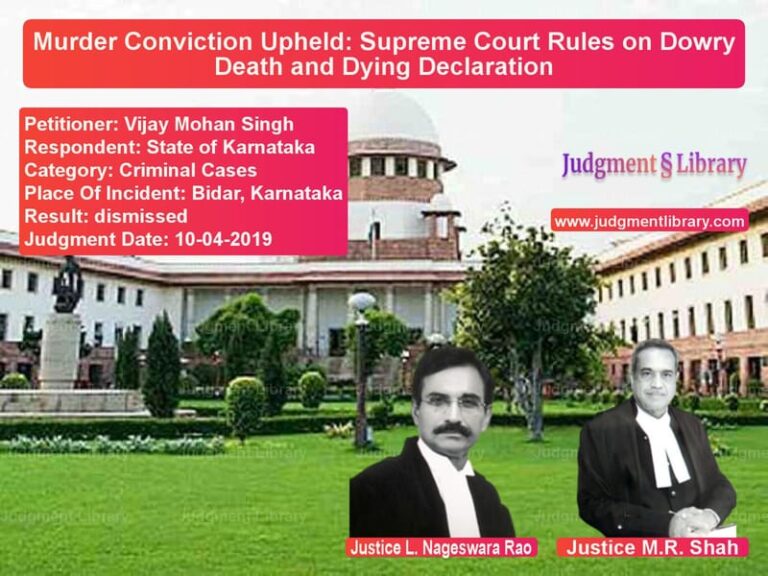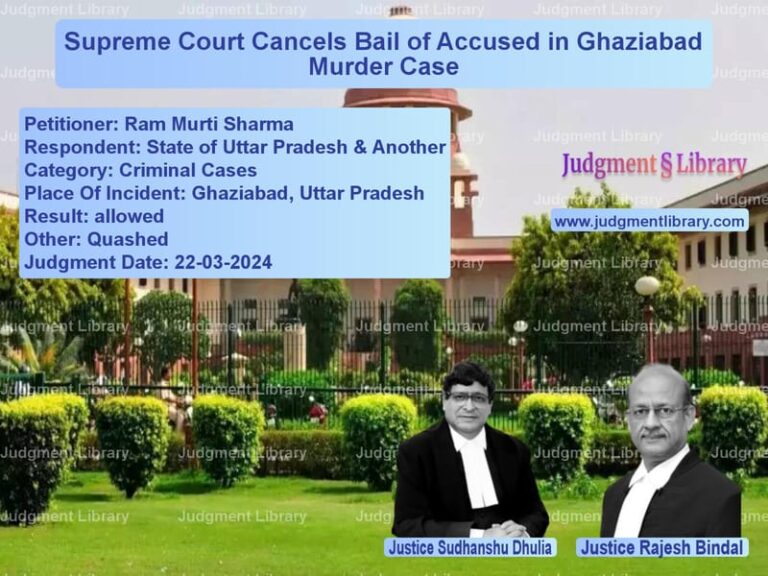Supreme Court Clarifies Partner Liability in Cheque Bounce Cases: Legal Requirements for Retirement from Partnership
In a significant ruling that clarifies the legal responsibilities of partners in cheque bounce cases, the Supreme Court has restored criminal proceedings against a partner who claimed to have retired from a partnership firm before the disputed cheques were issued. The judgment delivered on May 19, 2025, emphasizes that mere claims of retirement without complying with statutory formalities under the Indian Partnership Act cannot absolve partners from liability under the Negotiable Instruments Act.
The case originated from a complaint filed by Shivappa Reddy against M/s AVS Constructions, a partnership firm, and its partners including S. Srinivasan. The dispute involved twelve cheques of ₹50,00,000 each, aggregating to ₹6,00,00,000, issued towards refund of sale consideration. These cheques, signed by authorized signatory S. Yuvaraju, were dishonored due to ‘stop payment’ instructions.
The Legal Battle Begins
After the cheques were dishonored, Shivappa Reddy duly served statutory notices upon all accused, including S. Srinivasan. When no payment was received, he filed a complaint under Section 138 of the Negotiable Instruments Act. The trial court took cognizance of the offence and issued summons to all accused.
Read also: https://judgmentlibrary.com/supreme-court-cancels-bail-in-murder-case-land-dispute-turns-deadly/
At this stage, S. Srinivasan approached the High Court under Section 482 of CrPC seeking quashing of proceedings against him. His primary defense was straightforward: he claimed to have retired from the partnership firm on April 1, 2015, before the cheques were issued, and therefore could not be held liable for the firm’s debts.
The Petitioner’s Arguments
Shivappa Reddy strongly contested these claims before the High Court. He argued that the statutory mandates under Sections 32, 62 and 63 of the Indian Partnership Act had not been complied with. The petitioner obtained a certified copy of Form-A maintained by the Registrar of Firms which depicted that the respondent was still shown as a partner of the firm as of August 27, 2020.
The petitioner made serious allegations that “the Respondent, in an attempt to escape his liability, had fabricated a backdated retirement deed in connivance with the other accused and got an entry made in the ledger of the Registrar of Firms on 20.10.2020 that he had ceased to be a partner.” This entry was made subsequent to both the date of cheque issuance and the legal notice.
Most importantly, the petitioner emphasized that Section 72 of the Partnership Act had not been complied with, which mandates a retired partner to publish a public notice in one of the vernacular newspapers circulated in the district where the firm is located. No such publication had been produced by the respondent.
The petitioner also highlighted that the trial court had already dismissed the respondent’s discharge application on merits on September 1, 2021, after considering all these aspects.
The High Court’s Decision
Despite these arguments, the learned Single Judge of the High Court allowed the petition and quashed proceedings against S. Srinivasan. The High Court accepted the respondent’s contention that he had ceased to be a partner before the cheques were issued. The court also noted that the cheques had not been signed by the respondent but by S. Yuvaraju, and held that there was no legally enforceable debt against the respondent.
Supreme Court’s Analysis
The Supreme Court bench comprising Justice Abhay S. Oka and Justice Augustine George Masih carefully examined the statutory requirements under the Partnership Act. The court emphasized that “A perusal of Section 72 of the Partnership Act would show that notice of retirement must be given to the Registrar of Firms under Section 63 and by publication in the Official Gazette, and in at least one vernacular newspaper circulated in the district where the Firm to which it relates has its place or principal place of business, such notice needs to be published.”
The court further elaborated that “Section 32 of the Partnership Act deals with the retirement of a partner. In addition, Section 62 of the Partnership Act deals with the information to be submitted with regard to the change in the names and addresses of the partners to the Registrar of Firms. What, therefore, is mandated under the Statute is that if any registered Firm intends to include or exclude by way of resignation, expulsion or addition of any partner in the Firm, an intimation to the said effect has to be forwarded and conveyed to the Registrar of Firms.”
The judgment made it clear that “None of these requirements as provided and mandated for under the Statute, have been adhered to by Respondent No.1. Merely putting forth a resignation or the partners entering into an agreement or drafting a deed or/and accepting the resignation of a partner of the Firm is insufficient for discharging the liability of a partner of the Firm unless a proper entry to the said effect after the publication has been given effect to with the same, having been recorded in the Register of Firms in the office of the Registrar of Firms as provided for in Section 63 of Partnership Act.”
Critical Factual Findings
The Supreme Court also noted important factual aspects that the High Court had overlooked. The court observed that “simply because the cheques were signed by S. Yuvaraju (Accused No.2), who was the authorized signatory of the Partnership Firm (Accused No.1), does not discharge the liability of the Respondent.”
This was particularly significant because “in the complaint filed under Section 200 of the CrPC by the Appellant, a categorical averment is made that the Respondent along with the other two partners of the Partnership Firm (Accused No.1) is involved in day-to-day affairs of the said Firm. In the complaint, it has clearly been pleaded that the Respondent-Accused No.4 was present at the residence of Accused No.2 when the cheques were signed. Further allegations are there to the effect that Accused No.3 and Respondent Accused No.4 had stated that they would ensure that the money is repaid.”
The court concluded that “These facts collectively demonstrate that the requirements under Section 141 of the NI Act have been satisfied. Therefore, the Respondent cannot escape from the liability concerning the cheques which were issued by the Respondent.”
Jurisdictional Limits
An important aspect of the Supreme Court’s reasoning concerned the jurisdictional limits of Section 482 CrPC. The court emphasized that “All these aspects are mixed questions of fact and law touching on the anvil of disputed questions calling for proof by way of evidence, which cannot be gone into and decided in a proceeding under Section 482 CrPC. Such matters require the parties to lead evidence as per their respective stands, and hence, calling for no interference by the High Court.”
The court firmly stated that “Without further going into the details of the pleadings relatable to the facts, we are of the view that the High Court has erred in law by exceeding its jurisdiction while exercising its powers under Section 482 CrPC.”
Final Ruling and Implications
Setting aside the High Court’s order, the Supreme Court restored the proceedings before the Additional Chief Metropolitan Magistrate, Bengaluru. The court made it clear that “Any observations made in this order shall have no bearing on the merits of the case in the trial, and the same, if any, are restricted to the decision in the limited compass of the jurisdictional sphere as exercised by the High Court.”
This judgment serves as an important reminder that partners cannot escape liability for cheque bounce cases by merely claiming retirement without following the strict statutory procedures. The ruling reinforces that proper publication of retirement notices and updating records with the Registrar of Firms are essential prerequisites for a partner to claim discharge from liability. The decision also reiterates the limitations on the High Court’s powers under Section 482 CrPC, emphasizing that disputed questions of fact must be decided through trial proceedings rather than in quashing petitions.
The Supreme Court’s ruling brings much-needed clarity to partnership law and cheque bounce cases, ensuring that technical claims of retirement cannot be used to defeat the interests of creditors without strict compliance with statutory requirements.
Petitioner Name: Shivappa Reddy.Respondent Name: S. Srinivasan.Judgment By: Justice Abhay S. Oka, Justice Augustine George Masih.Place Of Incident: Bengaluru.Judgment Date: 19-05-2025.Result: allowed.
Don’t miss out on the full details! Download the complete judgment in PDF format below and gain valuable insights instantly!
Download Judgment: shivappa-reddy-vs-s.-srinivasan-supreme-court-of-india-judgment-dated-19-05-2025.pdf
Directly Download Judgment: Directly download this Judgment
See all petitions in Cheque Dishonour Cases
See all petitions in Fraud and Forgery
See all petitions in Contract Disputes
See all petitions in Debt Recovery
See all petitions in Corporate Compliance
See all petitions in Judgment by Abhay S. Oka
See all petitions in Judgment by Augustine George Masih
See all petitions in allowed
See all petitions in Quashed
See all petitions in supreme court of India judgments May 2025
See all petitions in 2025 judgments
See all posts in Criminal Cases Category
See all allowed petitions in Criminal Cases Category
See all Dismissed petitions in Criminal Cases Category
See all partially allowed petitions in Criminal Cases Category

